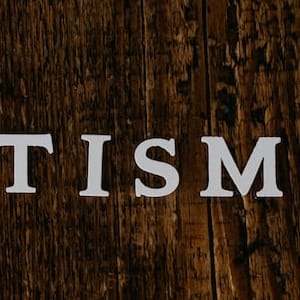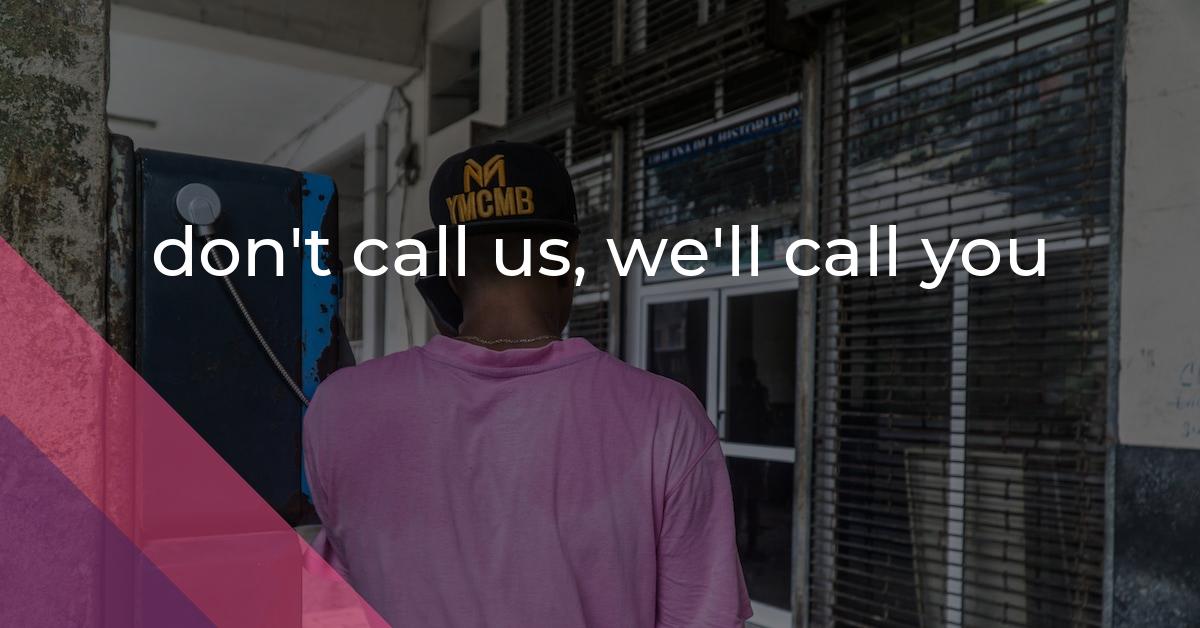don’t call us, we’ll call you: Idiom Meaning and Origin
What does ‘don't call us, we'll call you’ mean?
The idiom "don't call us, we'll call you" means that the person or organization being addressed will contact the other person or organization if they are interested or have further information. It is often used in a dismissive or uninterested manner.

Idiom Explorer
The idiom *phone in* means to make a telephone call, typically to provide information or participate in a conversation without being physically present.
"Let's not and say we did" is an idiom used to suggest avoiding an activity or responsibility while still claiming to have done it. It implies a desire to evade or deceive without facing the consequences of the truth.
The idiom "let's be having you" is an informal and direct way of urging someone to come or participate. It is often used with a sense of urgency or enthusiasm to encourage prompt action or involvement.
The idiom "it's none of your business" means that a person should not interfere or ask about something that does not concern them.
The idiom "in touch" means to have contact or communication with someone. It implies staying connected or keeping oneself updated on a regular basis.
The idiom *I'll tell you* is used to grab someone's attention or emphasize a point before providing information or sharing an opinion. It signals that the speaker has something important to say or wants to share insight.
The idiom "hold the phone" is used to tell someone to wait or pause because new information or a change in plans has occurred.
The idiom "have someone's number" means to understand someone's true nature or intentions, often implying that you can see through their facade or deception.
Elusive Commitment
The idiom "don't call us, we'll call you" is a commonly used phrase in American English. It is often used in response to a job interview or audition, indicating that the person or organization will contact the individual if they are interested.
The phrase has its origins in the entertainment industry, specifically in acting auditions and casting calls. In these competitive fields, actors and performers often attend numerous auditions without receiving a call back or being offered a role. The phrase "don't call us, we'll call you" is a way of managing expectations and maintaining professional boundaries. It is a polite way of indicating that the individual is not being considered or selected for the opportunity.
Originating in the early to mid-20th century alongside the growth of the film and theater industries, the phrase quickly became a popular idiom in American English. Its usage has since extended beyond auditions and job interviews to other situations where someone expresses interest in a particular opportunity or offers their services.
For example, someone may reach out to a company to inquire about potential employment opportunities. If the company is not actively seeking new employees, they may respond with the idiom "don't call us, we'll call you." This conveys that the company is not currently looking to hire, but will reach out if the person's services are needed in the future.
The phrase "don't call us, we'll call you" carries a sense of finality and closure. It signifies the end of an interaction or opportunity, with the responsibility for future contact firmly placed on the person or organization being approached.
However, despite its finality, the idiom also leaves room for ambiguity and possibility. It implies that there may still be a slim chance of receiving a call or further contact. The phrase lingers in the mind of the individual being addressed, fostering a glimmer of hope or uncertainty about the future.
Another related idiom is "call up." This phrase means to telephone someone, typically to talk or convey information. It is often used in a casual context to describe a phone conversation. In the context of "don't call us, we'll call you," the idiom "call up" highlights the power dynamic between the person being interviewed or auditioned and the person or organization conducting the process.
By using the phrase "don't call us, we'll call you," the person or organization is asserting their authority and control. They are indicating that they will be the ones to initiate contact if there is any further interest or need for communication. The individual being interviewed or auditioned is expected to wait for that call rather than proactively reaching out. The idiom "call up" helps emphasize this dynamic.
An additional related idiom is "phone in." This phrase refers to a casual or informal phone call, often made quickly or without much preparation. It can also imply a lack of commitment or effort on the part of the caller. In the context of "don't call us, we'll call you," the idiom "phone in" highlights the passive nature of the individual being interviewed or auditioned.
When someone is told "don't call us, we'll call you," they are expected to wait passively for the other party to initiate contact. They are not encouraged to "phone in" or reach out proactively. The idiom "phone in" further emphasizes the idea that the individual should not make any further effort to contact the person or organization conducting the interview or audition.
The idiom "don't call us, we'll call you" is a commonly used phrase in American English. It originated in the entertainment industry and has since been widely adopted in other contexts. It signifies the end of an interaction or opportunity, with the responsibility for future contact placed on the person or organization being approached. The related idioms "call up" and "phone in" highlight the power dynamic and passive nature of the individual being interviewed or auditioned.
Example usage
Examples of how the idiom "don't call us, we'll call you" can be used in a sentence:
- "After my job interview, the employer said, 'Don't call us, we'll call you'."
- "I applied for a loan at the bank, and they told me, 'Don't call us, we'll call you'."
- "I auditioned for a role in a play, and the casting director said, 'Don't call us, we'll call you'."
This idiom is commonly used in situations where someone has applied for a job, loan, or opportunity and is unsure about the outcome. It essentially means that the person should wait to be contacted by the relevant party instead of making follow-up calls themselves. The phrase is often used to politely decline further communication or to express a lack of interest without explicitly saying so. It is a way of asserting that the decision rests with the other party and they will be the ones to initiate contact if necessary.
More "Rejection" idioms



